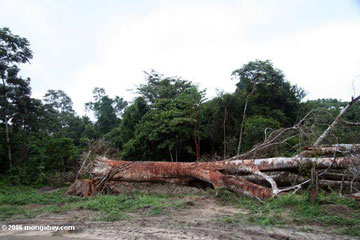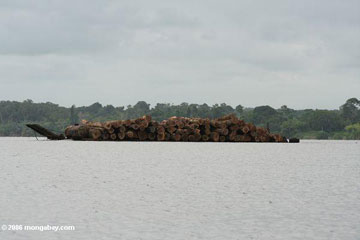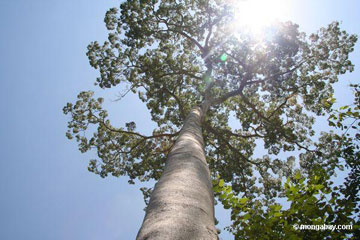Criticism of the FSC grows stronger in some activist circles
The Forest Stewardship Council (FSC) has come under increasingly harsh criticisms from a variety of environmental organizations. The FSC is an international not-for-profit organization that certifies wood products: its stamp of approval is meant to create confidence that the wood was harvested in an environmentally-sustainable and socially-responsible manner. For years the FSC stamp has been imperative for concerned consumers in purchasing wood products. Yet amid growing troubles for the FSC, recent attacks from environmental organizations like World Rainforest Movement and Ecological Internet are putting the organization’s credibility into question.
Last week the World Rainforest Movement released a scathing press release calling a decision by the FSC to certify eucalyptus plantations in Brazil its “death certificate.” The eucalyptus plantations are owned by Veracel, a partnership between Aracruz Celulose of Brazil and Stora Enso of Sweden-Finland, which has a shaky environmental record. The press release alleges that Veracel “has a very well known record of harmful actions, including violating local communities’ rights over land, to environmental pollution, water depletion and ecosystem destruction.” World Rainforest Movement’s greatest concern, however, is that by certifying Veracel’s eucalyptus plantations, the FSC is stating that large-scale monoculture plantations are environmentally sound, socially responsible, and beneficial to local people. Whereas research has shown that monoculture plantations support little biodiversity, result in CO2 emissions relative to natural forests, and undermine the efforts of local people to manage forests in a sustainable manner. In calling this decision the FSC’s “death certificate” the World Rainforest Movement asserts that “the certification of Veracel is not an isolated fact, but the last piece in a chain of failures.”

|
As this press release emerged, the FSC was already under criticism by another environmental organization, Ecological Internet. In early March Ecological Internet began a campaign stating that the FSC’s support for logging old-growth forests was completely at odds with its purpose. The campaign targets some of the world’s most influential environmental and well-respected NGOs, asking them to withdraw their support from the FSC. These include Greenpeace, WWF, Rainforest Action Network, NRDC, Forest Ethics, Friends of the Earth and the Rainforest Alliance. Ecological Internet claims that, much like supporting monoculture plantations, the support of ancient forest logging diminishes biodiversity, causes net carbon losses, and harms the forest’s ecology.
“It has become evident to environmentalists in the know that FSC has become an obstacle to ending ancient forest destruction, addressing climate change and biodiversity loss, and promoting desirable ecologically based practices in regenerating and planted forests,” Ecological Internet founder Glen Barry told mongabay.com. “The organization is plagued with conflicts of interest, poor quality assurance mechanisms, and generally has failed the world’s forests. As such, we are in the uncomfortable position of protesting greenwashing NGO FSC supporters, who are finding it quite difficult to acknowledge they have been critical in creating and maintaining the FSC myth.”

|
Dr. Barry’s criticism of NGOs that support the FSC has touched off sharp debates within and without these organizations. The situation has become so tense that the Rainforest Alliance—usually a group that does the pro-forest campaigns—recently faced environmental protesters at a ‘Green Leaders’ cocktail party for their support of the FSC and old-growth logging. The Rainforest Alliance has said they will join in a debate regarding their support of old-growth logging.
Both of the reports emerged after face-saving efforts by the FSC in Indonesia where an inquiry by The Wall Street Journal last year prompted the organization to effectively revoke certification for a Singapore-based Asia Pulp & Paper Co. (APP) project on the Indonesian island of Sumatra. The admission, which environmentalists said showed the FSC had relaxed its certification standards to the point at which APP could qualify for the eco-label despite a poor environmental record, threatened to undermine the credibility of its labeling scheme.
A report released this week by the Environmental Investigation Agency (EIA) and Telepak on illegal logging in Southeast Asia has provided further trouble for the FSC. The report uncovered that corporations are getting away with lying about certification. Furniture companies YourPriceFurniture.com and Kybotech Ltd. both claimed that all their products were FSC certified when the claim was patently untrue. Both companies sell wood furniture that has never received FSC certification. According to the report, Kybotech Ltd. when pressed admitted that “certain furniture sets were not actually certified.”

|
Such reports of FSC’s difficulties—both globally and locally—are not being ignored. In what may be the beginning of a large-scale abandonment of the FSC, last Tuesday the Swedish Society for Nature Conservation (SSNC) withdrew its long-time support of the FSC. In a statement the SSNC said that the “FSC functions badly in Sweden. The standard is weak, the lack of observance is substantial and the forest companies will to improve FSC is weak.” Sweden is not alone. Certification practices in the FSC in Ireland and the US have come under increased scrutiny, causing outcry amid many local environmental groups. Last year Norway went as far as banning use of all certified wood products in public buildings.
While its future seems increasingly precarious, the FSC still possesses widespread support from large environmental global players. Further no one has yet proposed a viable replacement for the should the organization does not survive rising criticism
In the meantime consumers are left increasingly in the dark when trying to purchase environmentally-sustainable and socially-responsible wood products. Caught in an environmental Catch-22, eco-conscious consumers who want to avoid supporting large-scale monoculture plantations and old-growth logging, seem forced to avoide both FSC certified and non-certified furniture.
The FSC did not reply to Mongabay’s request for comment.
Sources:
- World Rainforest Movement (2008). Veracel: FSC’s Death Certificate.
- Environmental Investigation Agency (EIA) and Telapak (2008). Borderlines. 19 March 2008
- Swedish Society for Nature Conservation (2008). Forest certification not good enough
- Barry, G. (2008). “Forest Liars” Campaign Launches. Ecological Internet March 8, 2008
- Butler, R. (2008). WSJ inquiry pushes FSC to cancel logging certification in endangered forest (mongabay.com)
- Butler, R. (2008). Norway bans tropical timber (mongabay.com)
More information
FSC-Watch.org tracks criticism of the FSC